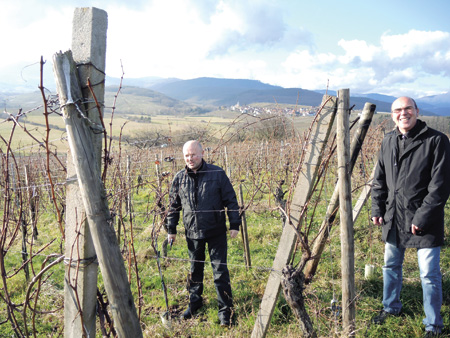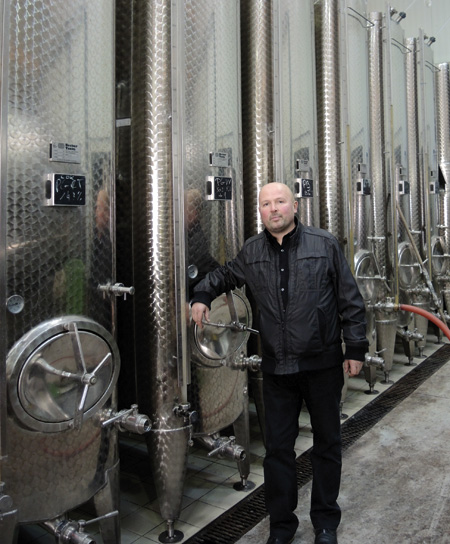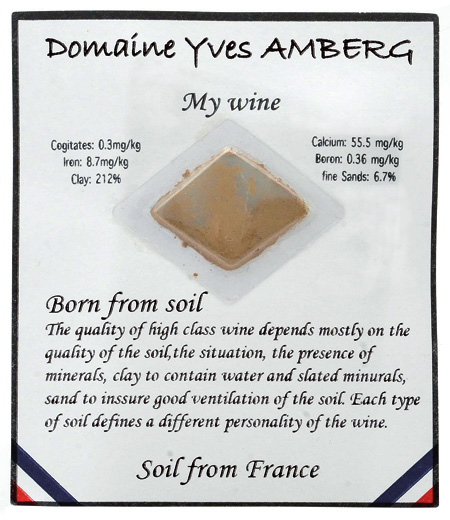Winegrowers’ portraits Epfig
In the largest wine village in Alsace, Epfig, a township of the Bas-Rhin department where 570 ha of vineyard neighbour wheat and other cereal fields, Roger Amberg created the family domain. As soon as he arrived in 1989, his only son Yves doubled the surface area of the estate, increasing it from 7 to 13 ha. Recently he installed a cellar, put in two presses and beautiful thermo-regulated stainless steel vats. And he is associated for two years with expressionist painter Georges Guthleber to give his terroir wines not only the taste but also the sense of touch by encapsulating in the label or under the cap foil a bit of mother Earth!

Independent wine grower Yves Amberg, pruning shears in hand, and his new associate Georges Guthleber.
Epfigis a small village of Alsace where the vines pry into the farmyards and the gardens of the little colourful half-timbered houses. A hill overlooks the village and here also the stocks cling to its sides and hurtle down the slope, crossing hiking trails to follow on foot, on horseback, by bike or with a rally car.
On top of the hill, Yves Amberg unveils his vineyard, with its sides facing south southeast, alluvial lands rich in organic matter, favourable to the production of delicious Riesling and Gewurztraminer at the same time fruity and harmonious. He insists about his conversion to organic farming; his work focuses on copper, sulphur, nettle manure for the treatments.
Since his adolescence, his feet in the ground, pruning shears in his hand, his leitmotif is to produce terroir wines, signature wines that reflect the subsoil and the hard work carried out to tame it. Organic farming preserves “the land bequeathed by one’s parents, borrowed from one’s children” to paraphrase a famous author. Manual harvest strengthens him even more in the good care provided to his vines. Further, he refines the filtration process and improves vinification by making it more precise to get fruitier and fresher wines. He purchases refrigerated vats of different sizes (53 to 160 hl) to blend them and vinify them. After a three-month ageing on fine lees of all the wines – except the Crémant that ages on the laths – he bottles his wines on the estate.
Yves Amberg in his new vat house.

This happy and curious man wanted to go further in the presentation of his cuvees to not only give a taste of the terroir but also enable to touch it. The encounter with expressionist painter Georges Guthleber, in Innenheim, leads him to redesign his labels to enrich them with the land of his vineyard. His new associate encourages him to register the concept “Guth Amberg”. After being taking in the vineyard, the earth is embedded like a treasure in a vacuum capsule integrated to the label. The project has been developed by an engineering agency in Hong Kong. This encapsulation of the earth from a plot in resin can take on demand the form of a logo, an animal or an insect such as a ladybird, and appear on the front or the back of the bottle. The manufactured labels can be affixed by classic labelling machines.
For the restaurants and sommeliers who leave the cork on the table, in Asia, as a souvenir for the customer, Yves and Georges have also designed with the same principle an independent plastic capsule with inclusion of earth that fits on the cork but under the cap foil. Such innovations imply an additional cost and are provided on order. They evidence the guarantee of authenticity of the soil and the wine, and are a way to combat counterfeit!
This innovative concept of promotion of France’s nourishing earth, and more precisely of Alsace, can also been considered as an element of solidarity among men. A praiseworthy initiative!

Domaine Yves Amberg